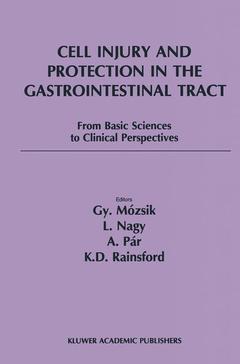Description
Cell Injury and Protection in the Gastrointestinal Tract, Softcover reprint of the original 1st ed. 1997
From Basic Sciences to Clinical Perspectives 1996
Coordinators: Mózsik Gyula, Nagy L., Rainsford K. D., Pár A.
Language: English
Subject for Cell Injury and Protection in the Gastrointestinal Tract:
Publication date: 11-2012
358 p. · 15.5x23.5 cm · Paperback
358 p. · 15.5x23.5 cm · Paperback
Description
/li>Contents
/li>Comment
/li>
The scientific main programmes of these series of symposia changed from time to time following the international scientific trends. The main programmes of the First Symposium were: 1. Gastric and intestinal cytoprotection; 2. Hepatoprotection; 3. Pancreatic protection. For the second one: 1. Gastrointestinal mucosal 'cytoprotection'; 2. Liver 'cytoprotection'; 3. Pancreatic 'cytoprotection'; 4. Free radicals and scavangers; 5. Computer approach to cytoprotec tion. For the third one: 1. Basic, central, peripheral and cellular mechanisms of gastrointestinaol cytoprotection; 2. Esophagal protection; 3. Gastric protection; 4. Small intestinal injury and protection; 5. Large bowel injury and protection; 6. Liver injury and protection; 7. Pancreas injury and protection. The main scientific programmes of the Fourth International Symposium on 'Cell Injury and Protection in the Gastrointestinal Tract' are: 1. General mechanisms of gastrointestinal injury and protection; 2. Cell injury and protection in the stomach; 3. Cell injury and protection in the small intestine and in the large bowel; 4. Cell injury and protection in the liver and pancreas; 5. Cell injury and protection of the premalignant status and malignant diseases in the gastrointestinal tract. The presented papers are published in this book. The abstracts of this meeting were published in Digestive Diseases and Sciences, and we record appreciation of the Editor ofthatjoumal for their publication. Some of the papers published here have appeared in Inflammopharmacology 1996;4:331-398.
Emerging research in gastrointestinal diseases.- I. General Mechanisms of Gastrointestinal Injury and Protection.- Analyses of pathogenic elements involved in gastric lesions induced by indomethacin in rats.- NO-NSAID: a novel class of anti-inflammatory drugs with reduced gastrointestinal and renal toxicity.- Gastric mucosal preventive effects of prostacyclin and ?-carotene, and their biochemical effects in rats treated with ethanol and HCl at different doses and time intervals after administration of necrotizing agents.- Reduction in gastric bicarbonate secretory response induced by NG-nitro-L-arginine methyl ester following repeated administration in rats.- Role of basic fibroblast growth factor (bFGF) and platelet-derived growth factor (PDGF) in ulcer healing.- The response of odontoblasts to injury to epithelial integrity: review.- Analysis of adrenoceptor- and related receptor-mediated gastric Cytoprotection.- II. Cell Injury and Protection in the Stomach.- The effect of intragastric capsaicin and resiniferatoxin on the indomethacin-induced gastric mucosal damage in rats.- A comparative study on the adenine nucleotide metabolism of acid-dependent and non-acid-dependent acute gastric mucosal injury in the rats.- Morphological aspects of BPC-peptide protection in ethanol-induced gastric lesions in rats.- Inhibitory effect of omentopexy on experimental chronic gastric antral ulcer formation.- Effect of suramin on ethanol-induced gastric mucosal injury: relationship between tissue distribution and severity of damage.- Effects of ranitidine, omeprazole and vagotomy on rat gastric mucosal phospholipids.- Are phospholipids involved in the gastroprotective capacity of avocado?.- Transmucosal potential difference as a marker of Helicobacter pylori-induced gastric mucosalbarrier damage.- Impaired gastric mucosal defence in Helicobacter pylori-related Conditions.- The role of cysteine and serine proteases in gastric carcinogenesis and their prognostic impact in gastric cancer.- Inhibition of rabbit gastric epithelial restoration by a water extract of Helicobacter pylori: evidence using a cultured cell model.- III. Cell Injury and Protection in Small Intestine and in the Large Bowel.- Zinc sulphate healing effects on cysteamine-induced duodenal ulcer in the rat.- Endogenous vasopressin damages duodenal mucosa during haemorrhagic shock in rats.- The vascular event as a target in changes of indomethacin-induced gastrointestinal mucosal damage after acute surgical and ‘chemical’ vagotomy in rats.- Involvement of corticotropin releasing factor (CRF) and vasopressin (AVP) in stress-induced exacerbation of experimental colitis in rats.- Protective effect of trapencaine in acetic acid-induced colitis in rats.- Pentadecapeptide BPC 157 beneficially influences the healing of colon—colon anastomoses in rats.- Cysteine and serine proteases in duodenal ulcer.- IV. Cell Injury and Protection in the Liver and in the Pancreas.- Treatment of chronic liver disease. Do cytoprotective agents interfere with drug-metabolizing activity?.- Recombinant interferon-?2btreatment for chronic hepatitis C. A prospective multicentre study in Hungary.- Immunological features and the effect of interferon treatment in chronic hepatitis C.- Long-term interferon-?2btherapy in chronic hepatitis B. A prospective multicentre study in Hungary.- New emphasis in the treatment of pancreatic insufficiency.- Metabolic responses to open and laparoscopic cholecystectomy.- Octreotide in the prevention of increased serum amylase after endoscopic cholangiopancreatography. Aprospective, randomized and multicenter study in Hungary.- V. Cell Injury and Protection of the Premalignant Status and Malignant Diseases in the Gastrointestinal Tract.- Genetic polymorphisms of CYP1A1, CYP2E1, and GSTM1 genes: susceptibility to colon cancer.- Serum carotenoids and malignant gastrointestinal diseases in patients.
The Fourth International Symposium on Cell Injury and Protection in the Gastrointestinal Tract: From Basic Sciences to Clinical Perspectives was held on 8--11 October, 1995 in Pecs, Hungary, under the auspices of the Hungarian Academy of Sciences, Hungarian Society of Gastroenterology (Section of Nutrition and Metabolism, Research Forum), International Union of Pharmacology, International Brain--Gut Society, Standing Committee of Ulcer Research and Medical University of Pecs. The main scientific programmes of the Fourth International Symposium on Cell Injury and Protection in the Gastrointestinal Tract are: The presented papers are published in this book.
© 2024 LAVOISIER S.A.S.




